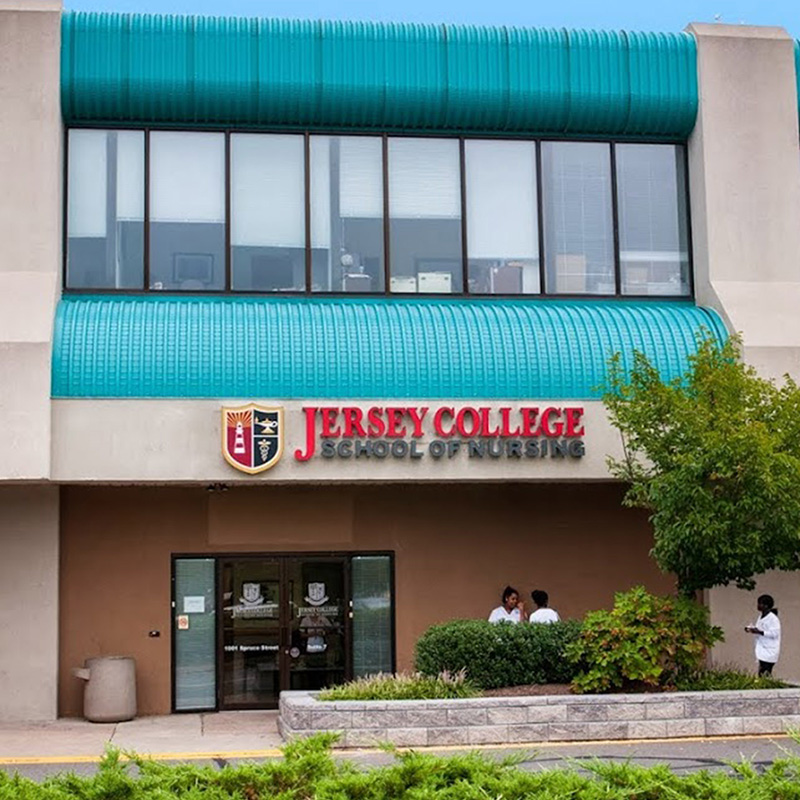
Nursing Schools in New Jersey
Becoming a Nurse in New Jersey
For anyone interested in attending a nursing school in New Jersey, it’s important to determine which specific program and path will be most appropriate for you and your personal career goals.
There are several paths towards building a career in nursing, each of which is usually tailored to one of the different occupations. At Jersey College, training is available to become a licensed practical nurse (LPN) or registered nurse (RN), with a few options for attaining each set of standards.
To become a licensed nurse in New Jersey, you must graduate from an approved program, such as those administered by Jersey College, and pass the NCLEX exam. Jersey College offers separate programs for those studying to become LPNs and RNs.
After obtaining your LPN or RN license, you may either enter the workforce as an entry-level healthcare professional or further your education. Jersey College graduates work in hospitals, emergency rooms, assisted living facilities, and outpatient centers all over the region.
One of the aspects that sets our programs apart is that Jersey College nurses learn a holistic approach to healthcare. Our faculty believes that proper nursing care requires the nurse to understand the physical, emotional, social, economic, and spiritual needs of the patient in an ever-changing, complex society.
Application Requirements
Those interested in attending nursing schools in New Jersey should be at least eighteen years old with a high school diploma or its equivalent, such as a GED.
To attend one of our New Jersey nursing school programs, applicants are required to pass an entrance exam. Students who are existing LPNs may waive out of an entrance exam requirement. Interviews, recommendations, and academic records are also considered in evaluating applicants to determine acceptance. Jersey College's admissions process includes an application and interviews with current faculty and/or administration. You must also provide proof of citizenship or a permanent resident green card.
Program Timelines
The length of a nursing program depends on many factors, including the chosen program and each student’s individual situation.
The LPN program at Jersey College usually takes between one and two years to complete. Students spend their first two terms learning the fundamentals of nursing, pharmacology, and adult patient care. The second two terms introduce maternal care, pediatric care, psychiatric nursing, and more advanced adult nursing.
Our LPN to RN Bridge program takes most students one to two years to complete. The curriculum covers all aspects of nursing in greater depth than the LPN program and introduces the leadership and management skills students will need in order to transition to an RN's responsibilities.
Our nursing schools in New Jersey also offer night classes, giving our students the freedom and flexibility to learn on their own schedules. The amount of time it takes to complete each program varies depending on each individual student's situation.
NurseLife After Graduation
Many of our dynamic nurses go on to experience rewarding careers providing excellent healthcare to patients across the region. Some choose to further their education or become educators themselves, while others find their niche in pediatrics, surgery, or outpatient care.
Jersey College graduates generally outperform other nursing schools on the NCLEX exam. In 2022, graduates of Jersey College's New Jersey Campuses had an average 1st-time NCLEX pass rate of 90%.
Program length is subject to change and is determined based on a number of factors, including, but not limited to: (i) pace of completion, (ii) quantity of credits taken per term, (iii) repeats of coursework, and (iv) leaves.
Cost of Nursing School
The cost of tuition for nursing schools in New Jersey depends on the program and campus location, as well as whether the classes are taken during the day or at night.
Program Tuition & Fees*

DAY

EVENING








Verification Fee (per term)





* subject to change
† Please contact your Financial Aid Planner for scholarship terms and conditions'
The Cost of Attendance (“COA”) is a technical term utilized to provide an estimate of the total amount of a student’s educational expenses during their enrollment. The components of COA are: (x) tuition and fees (books, course materials, supplies, and equipment) (“Direct College Expenses”); and (y) an allowance for (i) transportation; (ii) miscellaneous personal expenses; (iii) living expenses (including food and housing costs); (iv) a professional license and (v) dependent care and/or disability accommodations, where necessary (“Life Expenses”). This website only provides information related to Direct College Expenses; it does not include Life Expenses.
With our net price calculator, you can easily get a sense of what your tuition and net costs would be for the Jersey College nursing program that is best suited to your needs. Financial aid options are also available for those who qualify.
Nursing Salaries in New Jersey
To understand which nursing career path is best for you, it’s helpful to assess the earning potential for each position at a nationwide and state level.
First, here are some recent national nursing salary data, relative to education level:
- LPN median salary: $48,700
- RN median salary: $77,600
Salaries for nurses in New Jersey are among the best, ranking 9th highest nationwide for RNs at $89,690. The average LPN salary in 2021 was almost $59,000, much higher than most LPNs across the country (the national average salary for LPNs is $48,070). The range of average salaries for RNs in New Jersey spans from about $70,000 to almost $118,000.
Here is a sample of nursing salaries in selected cities across New Jersey. (Source: U.S. Bureau of Labor Statistics, as of January 2023.)
| Trenton | Jersey City/Newark/ New York City |
Camden/Philadelphia/ Wilmington |
|
|---|---|---|---|
| LPN Annual Median Wage |
$57,720 | $59,230 | $55,640 |
| RN Annual Median Wage |
$86,330 | $98,460 | $81,860 |
Jersey College does not promise or guarantee employment. Figures cited on this page are for informational purposes only and are no promise or guarantee of any certain wage.
For more statistics on the various occupations and their estimated wages, visit our nursing salary guide.
Nursing Jobs in New Jersey
Nurses work in various settings to provide patient care and support to physicians. They can be found in hospitals, physicians’ offices, various care facilities, schools, offices, correctional facilities, and performing in-home care.
Nurses are usually tasked with a range of patient care duties, including coordination with doctors while providing assistance. They tend to work full-time, and it’s not uncommon to have night, weekend, and on-call or extended shifts. More traditional business hours can be held for positions in offices and schools.
There are more than 3 million registered nurses in the US, and over 640,000 LPNs. Registered nurses most often work in hospitals, and more LPNs work in extended care, assisted living, and nursing homes.
The growth outlook for practical nursing careers in New Jersey is 8.5% by 2030. Each year, there are about 1,380 practical nursing job openings on average in the state. Registered nursing in New Jersey has an employment growth outlook of 8.6% by 2026, with roughly 5,240 annual openings. Given the impact of the global pandemic, these numbers are expected to continue rising.
There are over 165,000 active RNs and around 17,000 LPNs in New Jersey. Of RNs, more than half hold bachelor’s degrees, while more than a quarter possess associate's degrees. More than 72,000 of the state’s RNs work in personal and home healthcare, and more than 35,000 work as nursing assistants.
Employment and income figures have been gathered from the New Jersey Collaborating Center for Nursing and the US Bureau of Labor Statistics.
Frequently Asked Questions
- How do I find out if a New Jersey school is accredited?
If you are considering a certain nursing school or program and you need to verify whether it’s accredited or not, you can search the Database of Accredited Postsecondary Institutions and Programs (DAPIP) managed by the US Department of Education. The State of New Jersey also provides important information to help prospective nursing students choose a properly accredited institution.
You can learn more on our Accreditations and Licenses page.
- How many nursing schools are there in New Jersey?
In the state of New Jersey, dozens of schools and upwards of 150 programs exist for aspiring nurses to obtain the necessary education and training.
- Is New Jersey a good state for nursing?
Relative to other states, New Jersey is considered an excellent place to study nursing and enter the field professionally and has been ranked within the top 10 best states for nursing.
- Is there a 2-year nursing program in NJ?
Candidates across the state have several educational program tracks to choose from, including 1 to 2-year practical nurse training, 2-year associate’s degrees, 4-year bachelor’s degrees, and 1-2 year tracks for bridging LPN to RN.
Jersey College currently offers a 1 to 2-year LPN program and a 1 to 2-year LPN to RN Bridge program at our New Jersey campuses.
- Are there online nursing programs in NJ?
Yes, some online nursing programs may be available in NJ, and Jersey College may offer certain general education courses online. However, we prefer to offer nursing courses in-person to promote hands-on practice-based education.
Jersey College does offer popular evening nursing classes for our LPN Program at our campuses in Teterboro and Ewing.
Additional Resources
There are countless factors to be aware of when considering this occupation and in evaluating the top nursing schools in New Jersey. Numerous associations and organizations exist to support nurses, which can provide a wealth of reliable data for those considering entering the profession.
Learn more here:
To gain a more in-depth understanding of what distinguishes the various nursing positions and career paths, we also urge you to explore the following additional resources:
Become a Nurse with Jersey College
Becoming a medical practitioner is no small undertaking. If you’re looking to get a nursing degree, Jersey College is here for you. Whether you’re just starting your first course or years into your journey, you’ve come to a place that can support your needs. We’re here to help you start your career with every advantage you can possibly get.
If you want to learn more about the NurseLife, speak to your campus Admissions representative today – we look forward to meeting you soon!


